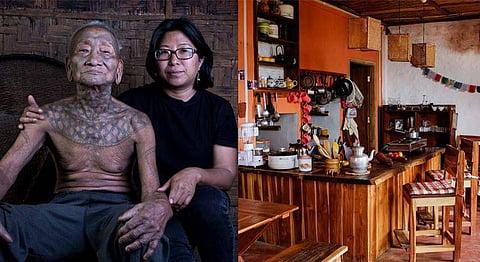
- HOMEGROWN WORLD
- #HGCREATORS
- #HGEXPLORE
- #HGVOICES
- #HGSHOP
- CAREERS
- ABOUT US
- CONTACT US

Almost a century ago, two dauntless men, appointed by the former colonial powers that be, embarked on a journey to a remote, unadministered area in the Northeastern corners of our country — the Naga hills. J. P. Mills of the Indian Police and J.H. Hutton, an anthropologist, found themselves traversing the distant terrains of Nagaland to acquire knowledge about its culture, traditions, and diversity. As the first British ethnographer to have explored this unsurveyed region, Hutton later documented his work in his book ‘Diaries of Two Hours in the Naga Hills’, mentioning Ahon – a tattooed headhunter of the Konyaks Tribe. Today, Ahon’s great-granddaughter Phejin Konyak is trying to keep alive the legacy of the Konyak tribe by running a tea plantation retreat and farmhouse in Nagaland.
Located about an hour and a half away from the nearest town of Mon in Nagaland, the Konyak Tea Retreat in Shiyong village was established in 1988 and is abound with orange orchards, tea plantations, and cattle. The stone-walled cottage, with its tribal paintings, exudes an ethnic charm that is often missing from modern homestays. With simple furniture made out of cane and wood, vibrant cutlery, two bedrooms, an open kitchen that is reflective of the Naga community way of living, and a vegetable garden overlooking the valley below, the experience at this farmhouse is almost like time travel — taking you back to the good old days of pastoral beauty and joy.
At Konyak Tea Retreat, apart from doing the obvious like admiring the beauty of the tea plantations and consuming fresh, organic produce from the farms, there’s a host of other activities to kickback and indulge. You can interact with the local farmers and even learn how to pick tea with them, harvest oranges during the month of November, or simply set up a bonfire and bask in Shiyong’s silence with a glass of home-brewed rice beer and the heartwarming stories of the villagers to give you company. With cascading waterfalls, verdant landscapes, and lush forests all around, the Konyak Tea Retreat is not just a rustic farm experience but also one that leaves you awe-inspired by the knowledge of the cultures and traditions of the Konyak Tribe, with the host herself offering some fascinating tribal insights.
One of the main 16 tribes of Nagaland, the Konyaks have always been known for their ferocious headhunting, which often kept them isolated from the outside world. Also famous for their elaborate tattoos, which serve as an integral part of the tribe’s identity for the rest of the world, the Konyaks tattoo themselves as a rite of passage that marks each person’s physical achievements and journey through life. Unfortunately, with the coming in of Christianity, the practice of tattooing oneself began to dwindle amongst the tribe members. Today, this ancient art of tattooing is slowly vanishing; the beauty of its techniques and the significance of each tattoo undocumented and lost to history.
The unique experience at Konyak has much to do with Phejin and her dedication towards preserving the history of her tribe, whether it’s through oral stories, anecdotes, or books. In fact as a researcher herself, Phejin, along with a Dutch photographer Peter Bos, has worked on ‘The Last of the Tattooed Headhunters’ – a book that is Phejin’s priceless attempt to document the traditions of the Konyak tribe before they’re lost forever. She is warm, friendly, and full of information about the historical significance of the art of tattooing, which is rooted in the proud belief that the tattoos would help the tribe member’s ancestors recognise them in the event of an afterlife.
Perhaps what truly stands out during a stay at the Konyak Tea Retreat is the awareness of how integral the tribal culture is to the village. It’s not something that is forcefully relayed through age-old anecdotes and whispers or kept hidden in a museum with the intention of stagnant preservation. The tribal culture, albeit slowly disappearing, is a part and parcel of the life in Shiyong. Whether it’s the Aoling Festival, in the month of April, that celebrates the ancient history of Konyak tribe or the Konyak delicacies, like local smoked meat, that have been passed down through generations, the Konyak culture is intrinsic to the life in Shiyong village. And maybe it is this, along with Phejin’s beautiful stories, that makes one want to stop time and stay there forever.
To plan a trip to Konyak Tea Retreat right away, click here.
Feature Image Courtesy: Konyak Tea Retreat
If you enjoyed this article, we suggest you read:
